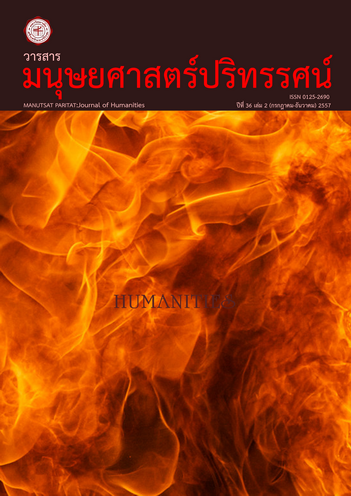วัจนกรรมปฏิเสธของพระภิกษุ
Abstract
บทคัดย่อ งานวิจัยนี้มีวัตถุประสงค์เพื่อศึกษาและเปรียบเทียบความเหมือนและความแตกต่างของกลวิธีการปฏิเสธในการสนทนาระหว่างพระภิกษุกับพระภิกษุ และพระภิกษุกับฆราวาส ตามตัวแปรทางสังคม ได้แก่ พรรษา อายุ และความสนิทสนม ผลจากการวิเคราะห์ข้อมูลพบว่ากลวิธีการปฏิเสธที่พระภิกษุปฏิเสธพระภิกษุ และกลวิธีการปฏิเสธที่พระภิกษุปฏิเสธฆราวาส มีทั้งความเหมือนและแตกต่างกัน กล่าวคือ พบว่ามี 3 กลวิธี ที่ทั้ง 2 กลุ่ม เลือกใช้เหมือนกัน ได้แก่ 1) กลวิธีการให้เหตุผลอ้างถึงกิจธุระ บุคคลที่สาม และสถานที่ 2) กลวิธีการปฏิเสธแบบตรงไปตรงมา และ 3) กลวิธีการแนะนำ แสดงให้เห็นว่าการปฏิเสธของพระภิกษุไม่ว่าจะเป็นการปฏิเสธพระภิกษุด้วยกันหรือปฏิเสธฆราวาส พระภิกษุมักเลือกใช้ 3 กลวิธีนี้เป็นส่วนใหญ่ อย่างไรก็ดี ทั้ง 3 กลวิธีมีปริมาณการใช้ใน 2 กลุ่ม ที่แตกต่างกัน เนื่องมาจากตัวแปรทางสังคม คือ พรรษากับความสนิทสนมของพระภิกษุ และอายุกับความสนิทสนมของฆราวาส จากผลการวิเคราะห์ข้อมูลสะท้อนให้เห็นว่าการปฏิเสธของพระภิกษุนอกจากจะต้องคำนึงถึงศีลและข้อปฏิบัติแล้ว พรรษา อายุ และความสนิทสนม รวมถึงสถานภาพทางสงฆ์เป็นตัวแปรที่สำคัญในการเลือกใช้กลวิธีปฏิเสธของพระภิกษุ คำสำคัญ วัจนกรรมปฏิเสธ พระภิกษุ ตัวแปรทางสังคม Abstract The objectives of this research were to study the similarities and the differences of refusal strategies used in two conversational situations: a monk to monk conversation, and a monk to layperson conversation. The study took into account the social variables, namely Phansa (first ordination into monkshood), age, and intimacy. The findings revealed that there were some similarities and differences of the refusal strategies used between monks, and between monks and lay people. Three refusal strategies were used by both groups: 1) giving excuses such as being busy, having to see someone or having to be somewhere, 2) refusing directly, and 3) giving advice. These three strategies were used both with monks and laymen. However, the three strategies were used differently in terms of frequency between two groups. The factors underlying such differences were social variables: Phansa and intimacy with monks, age and the intimacy with lay people. The findings revealed that when monks have to refuse, they always think about the rules for monks and the rules for practice. Furthermore, Phansa, age, the intimacy of monks, and social status of monks were important factors in selecting refusal strategies. Keywords: refusal speech acts, monks, social variablesDownloads
Published
2014-12-18
Issue
Section
บทความวิจัย


